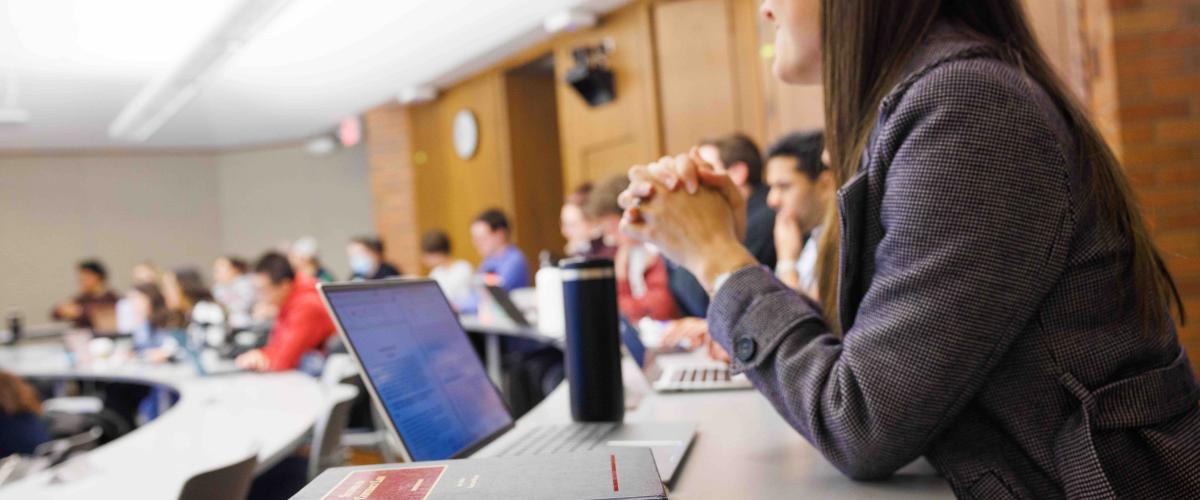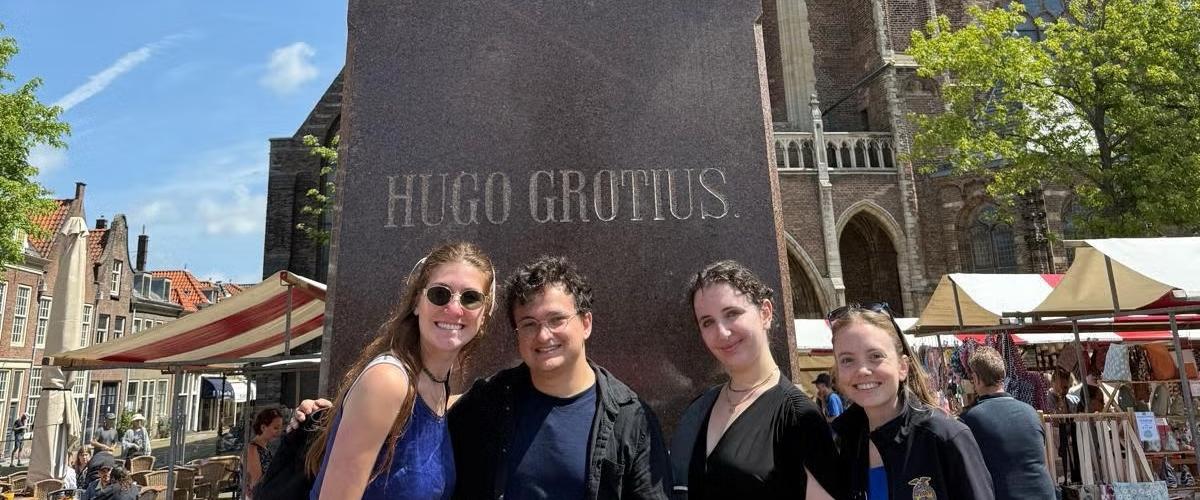The new arrivals to the Law School had an unforgettable welcome on August 28 when Andrew Cayley presented the first major lecture of the 2024-2025 academic year. The occasion was the annual Klatsky Endowed Distinguished Lecture in Human Rights Law. The Klatsky Lecture was created in 2001 by CWRU alum Bruce J. Klatsky, chair and CEO of Phillips Van Heusen Corp. and a member of the board of directors of Human Rights Watch, who wanted to expose our community to the foremost leaders in human rights on an annual basis.
In recent years, international criminal law has become one of the most important enforcement mechanisms for international human rights. And no matter the conflict, Andrew Cayley has been at the forefront of the effort to ensure accountability, having held a variety of positions at five different international tribunals over the past thirty years.
Topping off an impressive career in the field of international criminal justice, in December 2009, the UN Secretary-General appointed Cayley to be the Chief International Co-Prosecutor of the Extraordinary Chambers in the Courts of Cambodia (ECCC), where he successfully supervised the prosecution of the surviving leaders of the genocidal Khmer Rouge regime. He then served for a decade as the United Kingdom’s chief military prosecutor (the equivalent of the JAG in the US) and Chief Inspector of the Crown Prosecution Service (the equivalent of Inspector General in the US). In March 2024, the Chief Prosecutor, Karim Khan, asked Cayley to take up the position of Principal Trial Lawyer at the International Criminal Court (ICC). Cayley had previously led in one of the ICC’s first prosecutions of perpetrators in the Darfur conflict and was seen as the right person for this incredibly challenging job in this extraordinary time.
As the 2024 Klatsky Lecturer, Andrew Kaley joined a veritable "who's who" among the most impactful human rights luminaries on the planet who have delivered the Klatsky Lecture at Case Western Reserve University School of Law and received the Cox International Law Center Humanitarian Award for Advancing Global Justice. Sometimes called “Cleveland’s Nobel,” past award recipients include Samantha Power (US Ambassador to the UN), Harold Koh (Assistant Secretary of State for Human Rights), Prince Zeid Bin Ra'ad (UN High Commissioner for Human Rights), Navi Pillay (UN High Commissioner for Human Rights), Sir Christopher Greenwood (Judge of the International Court of Justice), Ken Roth (Executive Director of Human Rights Watch), Nicholas Koumjian (head of the Independent Investigative Mechanism for Myanmar), Catherine March-Uhel (head of the UN International Impartial and Independent Mechanism for Syria), Michael Reisman (President of the Inter-American Commission on Human Rights), Albie Sachs (anti-Apartheid activist and later Justice of the Constitutional Court of South Africa), Sean Murphy (member of the UN International Law Commission and President of the American Society of International Law), Paul Williams (President of the Public International Law & Policy Group), Fatou Bensouda (Prosecutor of the International Criminal Court), and most recently Leila Sadat (author of the International Crimes Against Humanity Treaty).
Given mixed views in the United States about recent actions by the International Criminal Court, Cayley’s lecture on August 28 had potential for igniting passions on both sides of the political divide. But he expertly thread the needle with a message of hope. Cayley began his moving remarks (available to view on the Law School’s Lecture Page) by describing some of the international criminal cases he has prosecuted over the years. He highlighted the relation between accountability and breaking the cycle of violence in troubled countries across the globe. He stressed the importance of impartiality and fairness at every turn, no matter the accused perpetrator. With reference to the recent cases of Ukraine and Gaza, Cayley diffidently acknowledged the legal, practical, and political challenges that arise when the International Criminal Court follows the evidence to the doorstep of leading figures across the globe. And above all else, he spoke of hope for an end to bloodshed and the role that justice can play in enduring peace. As he concluded, the audience responded with a sustained standing ovation–a uniquely enthusiastic reception for a law school speaker.




